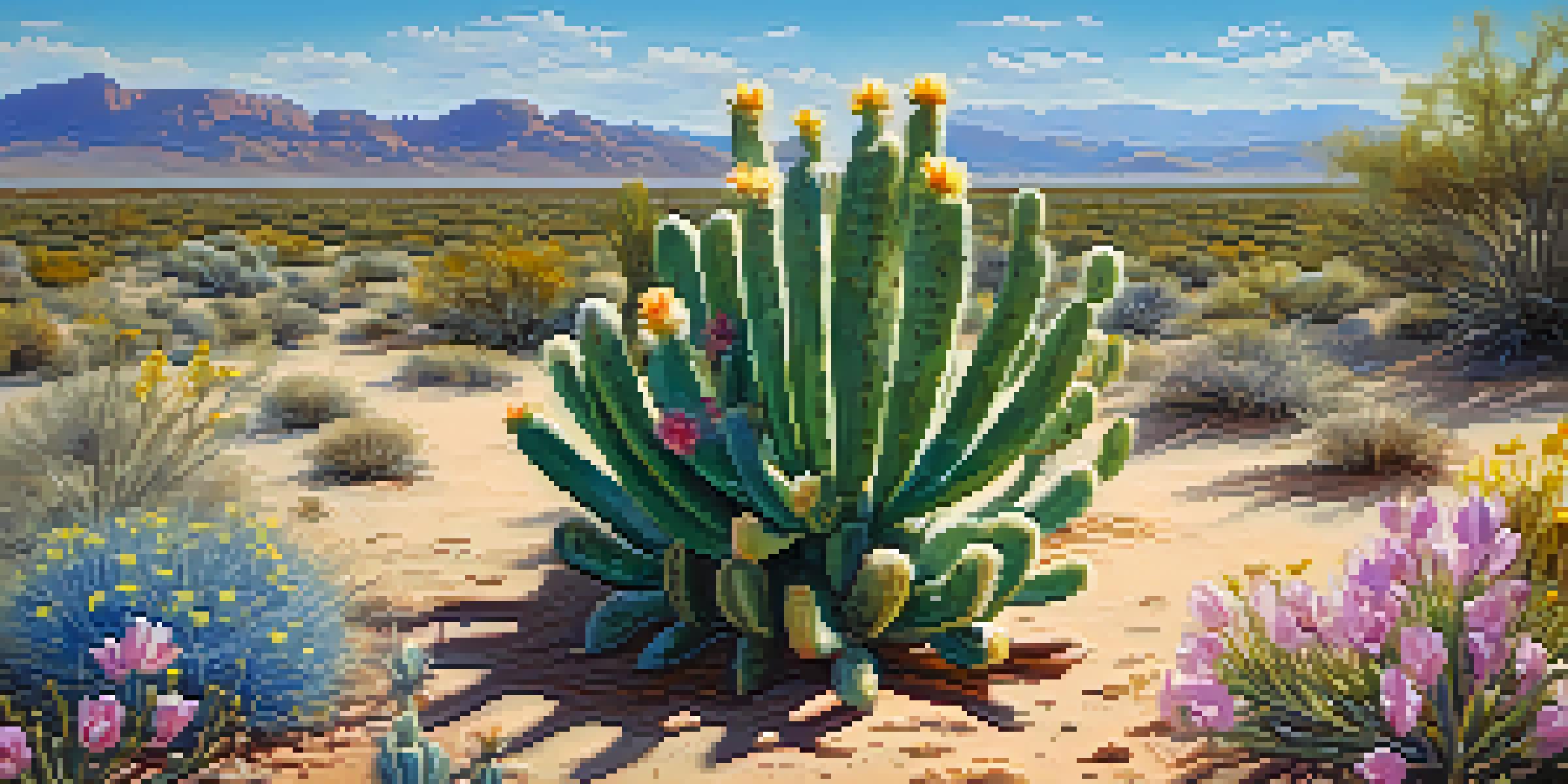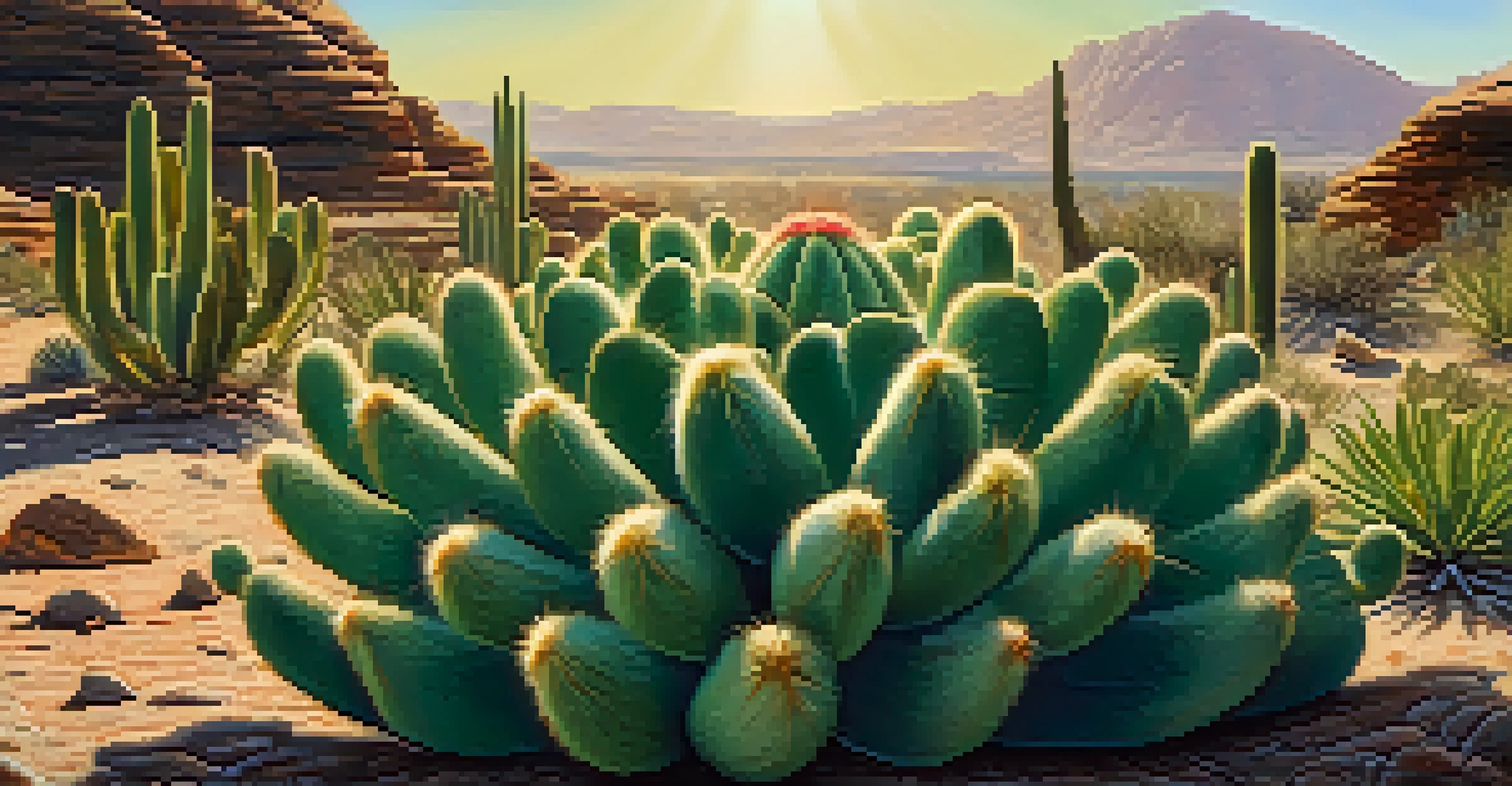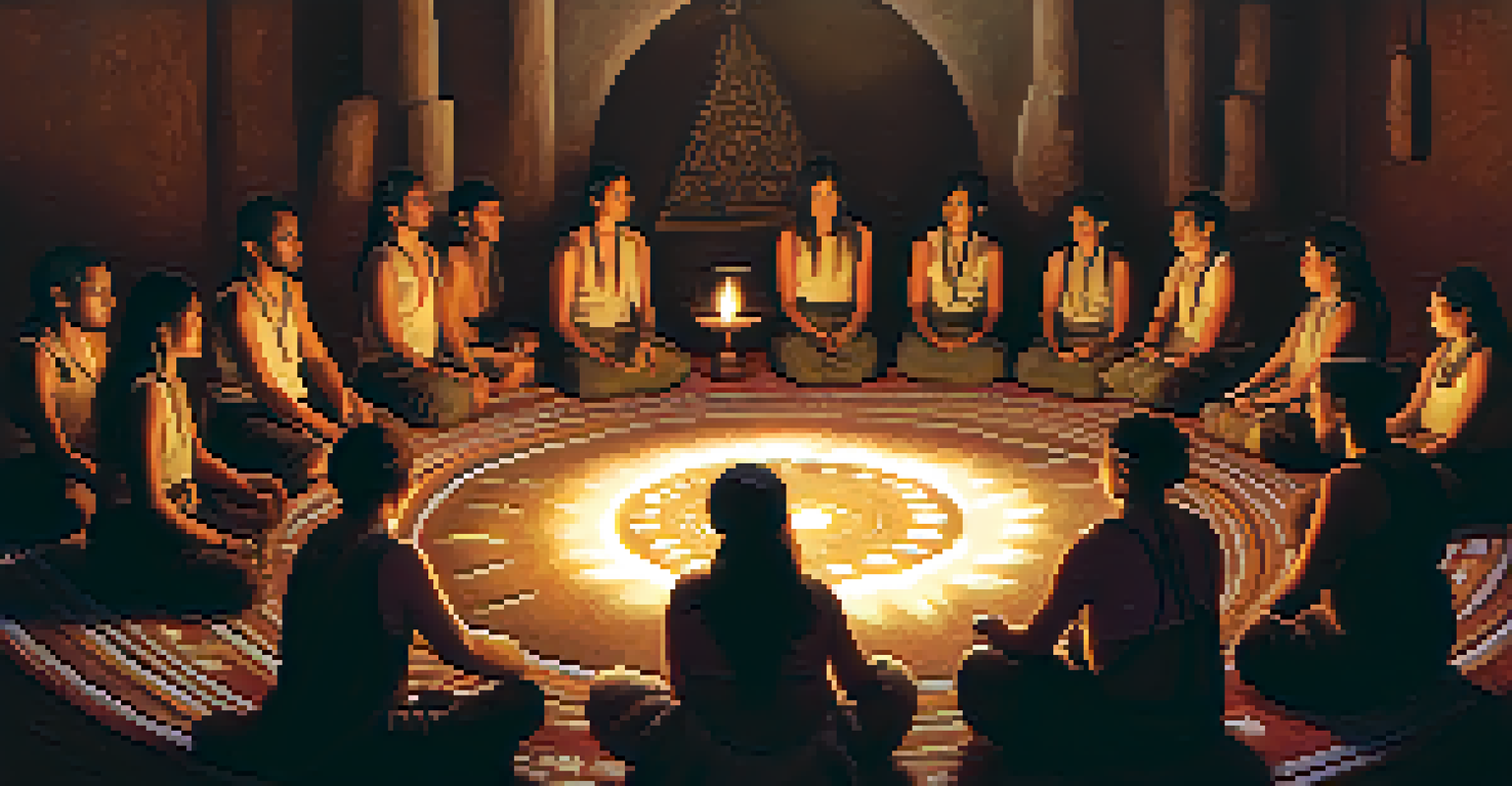Peyote and Its Role in Shaping Modern Spiritual Practices

Understanding Peyote: A Sacred Cactus
Peyote, a small cactus native to North America, has been used for centuries by Indigenous peoples for its psychoactive properties. This plant contains mescaline, a compound that alters perception and consciousness, leading to profound spiritual experiences. For many, peyote is not just a substance but a sacred tool that bridges the physical and spiritual worlds.
Psychedelics can offer a unique opportunity to explore the depths of our consciousness and reveal the hidden aspects of ourselves.
Traditionally, peyote is consumed during ceremonial rituals, often accompanied by singing, drumming, and communal sharing. These practices foster a deep sense of connection among participants and emphasize the importance of community in spiritual exploration. As people engage with peyote, they often report transformative insights and a heightened sense of awareness.
Today, the significance of peyote is evolving, as more individuals seek alternative paths to spirituality. The resurgence of interest in natural psychedelics has sparked discussions about their potential benefits, including mental health improvements and personal growth. This exploration of peyote's ancient roots is reshaping modern spiritual landscapes.
The Historical Context of Peyote Use
Peyote has a rich history that dates back thousands of years, particularly among Native American tribes. Its use is deeply intertwined with cultural and religious practices, serving as a means of connecting with the divine. The rituals surrounding peyote are not merely recreational; they are steeped in tradition and respect, highlighting its importance in Indigenous spirituality.

In the late 19th and early 20th centuries, the Native American Church was established to provide a legal framework for peyote use in spiritual ceremonies. This organization helped preserve the practices and beliefs surrounding peyote, while also advocating for the rights of Indigenous peoples. Understanding this historical context is crucial to appreciating the plant's significance today.
Peyote's Spiritual Significance
Peyote serves as a sacred tool for Indigenous peoples, facilitating profound spiritual experiences and community connection.
As modern spirituality continues to explore diverse influences, the historical reverence for peyote is often overshadowed by its recreational use. However, acknowledging its roots can foster a deeper respect for the plant and its role in various spiritual traditions. This balance of history and contemporary practice is essential for a holistic understanding of peyote.
Psychedelics and Modern Spirituality
In recent years, there has been a resurgence of interest in psychedelics, including peyote, as tools for spiritual awakening. Many seek these substances as alternatives to traditional religious practices, hoping to find deeper meaning and connection. This shift reflects a broader trend toward experiential spirituality, where personal journeys and insights take precedence over dogma.
The greatest gift of the ceremony is not the substance but the connection to oneself and to the community.
Psychedelics have been shown to facilitate profound experiences that can lead to lasting changes in perspective. Users often report feelings of unity with the universe, enhanced creativity, and a greater appreciation for life. These experiences can serve as catalysts for personal transformation, making psychedelics an appealing option for those on spiritual quests.
As society begins to embrace the therapeutic potential of psychedelics, the conversation surrounding their use in spiritual practices is evolving. This is prompting many to re-evaluate their beliefs and consider how substances like peyote can enhance their spiritual journeys. Ultimately, this exploration opens doors to new understandings of self and spirituality.
The Role of Community in Peyote Ceremonies
Community plays a vital role in peyote ceremonies, as these gatherings foster a sense of belonging and shared purpose. Participants often come together with a shared intent, creating a supportive environment for personal exploration. The collective energy in these ceremonies can amplify individual experiences, making them more profound and transformative.
During these gatherings, participants engage in rituals that honor the cactus and its sacred properties. This can include prayer, singing, and storytelling, all of which reinforce the communal bond. The shared experiences not only deepen personal insights but also strengthen connections between individuals, creating a network of support and understanding.
Community in Peyote Ceremonies
The communal aspect of peyote ceremonies fosters belonging and shared purpose, enhancing individual spiritual journeys.
In a world that can often feel isolating, the communal aspect of peyote ceremonies offers solace and connection. Many find that these gatherings provide a space for healing and growth, where they can explore their spirituality alongside others who share similar journeys. This emphasis on community enriches the overall experience of engaging with peyote.
Legal Perspectives on Peyote Use
The legal status of peyote varies significantly across different countries and regions, impacting its accessibility for spiritual practices. In the United States, the Native American Church's legal protections allow members to use peyote in ceremonies, but these rights are not universally recognized. This creates a complex legal landscape that can hinder some individuals from engaging with peyote spiritually.
As interest in psychedelics grows, so too does the conversation about their legalization and regulation. Many advocates argue for broader access to natural psychedelics, emphasizing their potential benefits for mental health and spiritual exploration. This push for change is gaining momentum, particularly as society begins to reevaluate its relationship with these substances.
Navigating the legalities of peyote use is crucial for those seeking to incorporate it into their spiritual practices. Understanding the laws and regulations surrounding its use can help individuals make informed decisions while respecting the traditions of Indigenous peoples. As discussions continue, the future of peyote in modern spirituality remains a dynamic and evolving topic.
Personal Transformation Through Peyote Experiences
Many individuals who engage with peyote report profound transformations in their lives, often describing a shift in perspective. These experiences can lead to greater self-awareness, personal healing, and a reevaluation of life priorities. For some, peyote acts as a mirror, reflecting inner truths that may have been previously hidden or ignored.
The insights gained during peyote ceremonies can inspire individuals to make meaningful changes in their lives. Whether it's improving relationships, pursuing new passions, or adopting healthier lifestyles, the impact can be significant. This process of transformation highlights the potential of peyote as a catalyst for personal growth.
Peyote's Sacred Role in Spirituality
Peyote is viewed as a sacred tool by Indigenous peoples, facilitating profound spiritual experiences and community connection.
However, it’s essential to approach these experiences with intention and respect. Understanding the significance of the journey and the proper context in which to partake can enhance the transformative potential of peyote. This mindful approach can lead to deeper insights and more lasting changes in one’s spiritual journey.
Embracing a Holistic Approach to Spirituality
The influence of peyote on modern spirituality encourages a more holistic approach to understanding the self and the universe. By integrating the lessons learned from peyote experiences, individuals can create personalized spiritual practices that resonate with their unique journeys. This blending of traditional wisdom and contemporary exploration fosters a richer spiritual experience.
As more people explore peyote and other natural psychedelics, there is an opportunity to redefine what spirituality means in today's world. Emphasizing personal experience, connection to nature, and community support can lead to a more inclusive understanding of spirituality. This evolution opens the door for diverse expressions of faith and connection.

Ultimately, embracing a holistic approach allows individuals to navigate their spiritual paths with authenticity and intention. By honoring the traditions of peyote while incorporating modern insights, seekers can cultivate a deeper relationship with themselves and the world around them. This journey toward spiritual enlightenment is as unique as each individual, fostering a sense of wonder and discovery.